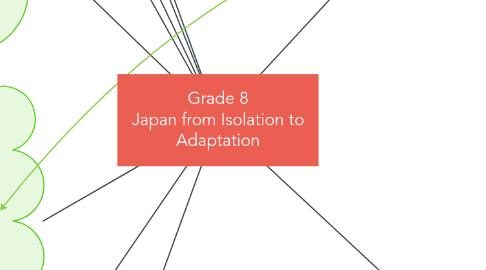
1. 8.1.1 appreciate the roles of time and geographic location in shaping a society’s worldview
2. 8.1.2 appreciate how a society’s worldview can foster the choice to remain an isolated society
3. 8.1.4 appreciate how a society’s worldview shapes individual citizenship and identity
4. 8.1.5 analyze the effects of cultural isolation during the Edo period by exploring and reflecting upon the following questions and issues
4.1. How did isolation during the Edo period lead to changes in Japan?
4.2. In what ways did Japan isolate itself from the rest of the world?
4.3. How did the changes resulting from isolation affect Japan economically, politically and socially during the Edo period?
4.4. How did the physical geography of Japan affect its worldview?
4.5. How did the shogun use the feudal system and the hierarchical social classes to maintain control of Japan?
5. 8.1.6 analyze the effects that rapid adaptation had on traditionally isolated Japan during the Meiji period by exploring and reflecting upon the following questions and issues
5.1. What were the motivations for the radical changes in Japan’s model of organization during the Meiji period?
5.2. How did Japan adapt to changes brought on by the transition from feudal to modern models of organization?
5.3. How did the changes resulting from adaptation affect Japan economically, politically and socially during the Meiji period?
5.4. In what ways did changes resulting from isolation in the Edo period compare to changes resulting from adaptation in the Meiji period?
5.5. What challenges emerged for the Japanese in maintaining traditional cultural aspects of their society while undergoing rapid change?
6. 8.1.3 appreciate how models of governance and decision making reflect a society’s worldview
7. Dimensions of Thinking
7.1. 8.S.1 develop skills of critical thinking and creative thinking
7.2. 8.S.2 develop skills of historical thinking:
7.3. 8.S.3 develop skills of geographic thinking
7.4. 8.S.8 demonstrate skills of oral, written and visual literacy
7.5. 8.S.7 apply the research process
8. Key Terms
8.1. expantionism
8.2. adaptation
8.3. isolation
8.4. society
8.5. worldview
9. Grade 7 Related items
9.1. Key terms
9.1.1. Imperialism
9.1.2. Immigration
9.1.3. Migration
9.2. Related Outcomes
9.2.1. 7.2.3 appreciate the challenges that individuals and communities face when confronted with rapid change
9.2.2. 7.1.2 appreciate the challenges of co-existence among peoples
9.2.3. 7.1.3 What were the social and economic factors of European imperialism?
9.2.4. 7.1.4 assess, critically, the economic competition related to the control of the North American fur trade by exploring and reflecting upon the following questions and issues
9.3. Dimensions of thought
9.3.1. 7.S.2 develop skills of historical thinking
9.3.2. 7.S.3 develop skills of geographic thinking
10. Grade 9 Related items
10.1. Key terms
10.1.1. Economy
10.2. Related Outcomes
10.2.1. 9.2.6 assess, critically, the interrelationship between political decisions and economic systems by exploring and reflecting upon the following questions and issues
10.2.2. 9.2.4 compare and contrast the principles and practices of market and mixed economies by exploring and reflecting upon the following questions and issues
10.2.3. 9.2.3 appreciate the impact of government decision making on quality of life
10.2.4. 9.1.5 analyze the role that citizens and organizations play in Canada’s justice system by exploring and reflecting upon the following questions and issues
10.2.5. 9.1.1 appreciate the impact of the Canadian Charter of Rights and Freedoms on rights and governance in Canada
10.2.6. 9.1.2 appreciate the various effects of government policies on citizenship and on Canadian society
10.2.7. 9.1.3 appreciate how emerging issues impact quality of life, citizenship and identity in Canada
10.3. Dimensions of thought
10.3.1. 9.S.1 develop skills of critical thinking and creative thinking
10.3.2. 9.S.2 develop skills of historical thinking
10.3.3. 9.S.3 develop skills of geographic thinking

